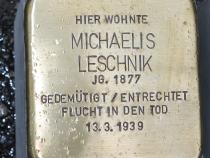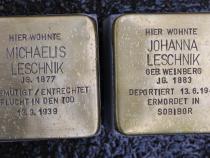Location
Badstraße 44
District
Gesundbrunnen
Stone was laid
07 March 2018
Born
17 April 1877 in Czarnikau (Posen)/Czarnków
Occupation
Juwelier und Uhrmacher
Escape into death
13 March 1939 in Berlin
Michaelis Leschnik was born on 17 April 1877 in Czarnikau in the province of Posen, which was then part of Imperial Germany. Nothing much is known about his Jewish family. As a young man he, like many others around the turn of the century, moved to the growing metropolis Berlin, where he soon found his feet. He became a master watchmaker, jeweller and optician and in 1904 opened his own shop at Bad Straße 42-43 in Wedding. His name first appears in the Berlin directory in 1906, occupation “watchmaker”. “It was a business with a good name in Gesundbrunnen,” a schoolfriend of his daughters later testified for the compensation proceedings. It is likely that Michaelis Leschnik and his family lived in the same building as the shop; in the years 1907 and 1910 he is registered as the manager of the building.
In January 1905 Michaelis Leschnik married Johanna Weinberg, from Wriezen on the River Oder, at Wedding registry office. In November 1905 their daughter Irene was born and in March 1908 their daughter Käthe Julie was born.
Religion must have been important to Michaelis as he was the last chairman of the Ahavas Ahim (brotherly love) synagogue association. Founded in 1899, the association had had a small synagogue built in the inner courtyard at Prinzen Allee 87.
In 1924 Michaelis Leschnik and his family moved a few doors down the street to Bad Straße 37. His business seems to have prospered as in 1929 he registered a second optician’s shop under his name, at Beussel Straße 27. An old photo of the window display shows that he supplied health insurance companies and specialized in photography.
The previous year, his elder daughter Irene had married Felix Zimmt, an optician, and in 1931 his younger daughter Käthe married Leopold Simon, a watchmaker. Michaelis Leschnik and his sons-in-law no doubt cooperated on business and provided mutual assistance. After his daughters had moved out, he and his wife Johanna moved to a comfortable 3-room apartment at Bad Straße 44, where they had a library and a piano. By the 1920s, Michaelis Leschnik had already become wealthy enough to buy a large apartment building near his home and share the ownership of another tenement in Wedding.
When the Nazis came to power, the Leschniks’ lives were turned around. Consequent to the Nazis’ boycott of Jewish businesses launched in April 1933 and general hostility towards Jews, Michael Leschnik was forced to close his optician’s and photographer’s shop at Beussel Straße in Tiergarten. In September 1933 he sold it – far below its actual value. One month later, in October 1933, his daughter Irene fled with her husband to Palestine. He only saw her once more: In 1937 she returned to Berlin to celebrate her father’s 60th birthday and stayed from April to July. “On 9 November 1938 Herr Leschnik’s entire business was completely wrecked and gutted. He was forced to sell the building at Buttman Straße (…) and could only look on as everything he had built up over the last 35 years, by hard work and the utmost thrift, was destroyed,” wrote his daughters’ friend for the compensation proceedings.
The watchmaker’s shop in Schöneberg run by his son-in-law Leopold Simon was also looted and demolished; the Simons fled with their two children to the Leschniks in Wedding and moved in with them at Bad Straße. Then Michaelis Leschnik, like all Jewish people, was required to pay the Nazis’ “Jewish property tax” – in his case, 7,500 Reichmarks, a sum which he no longer had at his disposal. A short time later, Michaelis Leschnik suffered a heart attack which he narrowly survived. According to a letter written by his wife Johanna, he was terribly afraid of emigrating as he could not imagine being able to pay their upkeep. Exhausted, humiliated and despairing, Michaelis Leschnik took his own life on 13 March 1939 in the nearby River Panke. Johanna Leschnik had her husband buried in the Jewish Cemetery in Weißensee, where his daughter Irene had a memorial stone erected for the whole family after the war.
In January 1905 Michaelis Leschnik married Johanna Weinberg, from Wriezen on the River Oder, at Wedding registry office. In November 1905 their daughter Irene was born and in March 1908 their daughter Käthe Julie was born.
Religion must have been important to Michaelis as he was the last chairman of the Ahavas Ahim (brotherly love) synagogue association. Founded in 1899, the association had had a small synagogue built in the inner courtyard at Prinzen Allee 87.
In 1924 Michaelis Leschnik and his family moved a few doors down the street to Bad Straße 37. His business seems to have prospered as in 1929 he registered a second optician’s shop under his name, at Beussel Straße 27. An old photo of the window display shows that he supplied health insurance companies and specialized in photography.
The previous year, his elder daughter Irene had married Felix Zimmt, an optician, and in 1931 his younger daughter Käthe married Leopold Simon, a watchmaker. Michaelis Leschnik and his sons-in-law no doubt cooperated on business and provided mutual assistance. After his daughters had moved out, he and his wife Johanna moved to a comfortable 3-room apartment at Bad Straße 44, where they had a library and a piano. By the 1920s, Michaelis Leschnik had already become wealthy enough to buy a large apartment building near his home and share the ownership of another tenement in Wedding.
When the Nazis came to power, the Leschniks’ lives were turned around. Consequent to the Nazis’ boycott of Jewish businesses launched in April 1933 and general hostility towards Jews, Michael Leschnik was forced to close his optician’s and photographer’s shop at Beussel Straße in Tiergarten. In September 1933 he sold it – far below its actual value. One month later, in October 1933, his daughter Irene fled with her husband to Palestine. He only saw her once more: In 1937 she returned to Berlin to celebrate her father’s 60th birthday and stayed from April to July. “On 9 November 1938 Herr Leschnik’s entire business was completely wrecked and gutted. He was forced to sell the building at Buttman Straße (…) and could only look on as everything he had built up over the last 35 years, by hard work and the utmost thrift, was destroyed,” wrote his daughters’ friend for the compensation proceedings.
The watchmaker’s shop in Schöneberg run by his son-in-law Leopold Simon was also looted and demolished; the Simons fled with their two children to the Leschniks in Wedding and moved in with them at Bad Straße. Then Michaelis Leschnik, like all Jewish people, was required to pay the Nazis’ “Jewish property tax” – in his case, 7,500 Reichmarks, a sum which he no longer had at his disposal. A short time later, Michaelis Leschnik suffered a heart attack which he narrowly survived. According to a letter written by his wife Johanna, he was terribly afraid of emigrating as he could not imagine being able to pay their upkeep. Exhausted, humiliated and despairing, Michaelis Leschnik took his own life on 13 March 1939 in the nearby River Panke. Johanna Leschnik had her husband buried in the Jewish Cemetery in Weißensee, where his daughter Irene had a memorial stone erected for the whole family after the war.




